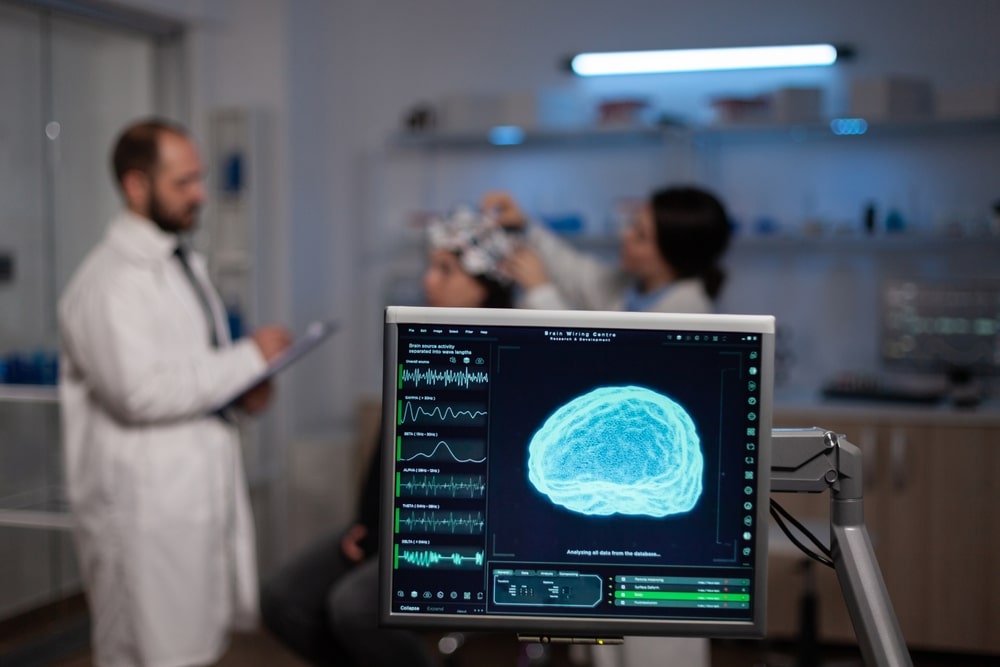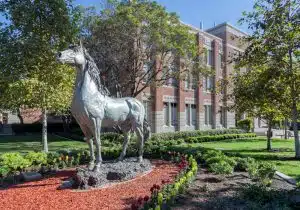Exploring the Neuroscience Program at Harvard University
Welcome to an in-depth exploration of the renowned Neuroscience Program at Harvard University. In this article, we will delve into the history, achievements, and intricacies of this esteemed program, giving you a comprehensive understanding of why it is considered one of the top destinations for neuroscience studies. So, grab a cup of coffee, and let’s begin our journey into the fascinating world of neuroscience at Harvard.
The History and Evolution of the Neuroscience Program at Harvard University
Harvard University has been a pioneering institution in the field of neuroscience for many decades. The Neuroscience Program, situated within the Harvard Faculty of Arts and Sciences, traces its roots back to the early 1960s.
Over the years, the program has grown and developed, fueled by pioneering breakthroughs and a commitment to pushing the boundaries of neuroscientific research. Today, it stands as an interdisciplinary academic hub that fosters collaboration and innovation among researchers, faculty, and students.
One of the key milestones in the history of the Neuroscience Program at Harvard University was the establishment of the Harvard Brain Science Initiative in 2016. This initiative brought together researchers from various disciplines, including neuroscience, psychology, biology, and computer science, to tackle some of the most pressing questions in brain research. Through this collaborative effort, the program has been able to make significant strides in understanding the complexities of the brain and its functions.
Why Harvard University is a Top Destination for Neuroscience Studies
Harvard’s Neuroscience Program attracts students from all over the world and for good reason. With its outstanding faculty, cutting-edge research facilities, and diverse range of academic resources, Harvard provides an unparalleled environment for learning and advancement in the field of neuroscience.
Students have the opportunity to work alongside esteemed researchers, engage in ground-breaking studies, and access a vast network of experts, all of which contribute to the program’s exceptional reputation.
One of the key factors that set Harvard University apart as a top destination for neuroscience studies is its commitment to interdisciplinary collaboration. The university encourages students to explore connections between neuroscience and other fields such as psychology, biology, computer science, and philosophy. This interdisciplinary approach not only broadens students’ perspectives but also fosters innovative research and the development of new methodologies.
In addition to its academic excellence, Harvard University offers a vibrant and supportive community for neuroscience students. The university organizes various events, seminars, and conferences that bring together students, faculty, and professionals in the field.
These opportunities allow students to network, exchange ideas, and stay updated on the latest advancements in neuroscience. Moreover, Harvard’s extensive library resources, state-of-the-art laboratories, and funding opportunities further enhance the learning experience and enable students to pursue their research interests.
The Cutting-Edge Research Facilities at Harvard’s Neuroscience Program
Harvard’s Neuroscience Program boasts state-of-the-art research facilities that provide students with the tools and resources they need to conduct groundbreaking studies. From advanced imaging technologies to molecular biology laboratories, students have access to a diverse range of equipment and techniques. This enables them to explore and understand the intricacies of the human brain at various levels, from molecular and cellular mechanisms to systems and cognitive neuroscience.
In addition to the advanced imaging technologies and molecular biology laboratories, Harvard’s Neuroscience Program also offers specialized facilities for studying brain function and behavior. These include behavioral testing rooms equipped with state-of-the-art equipment for conducting experiments on animal models and human subjects. These facilities allow researchers to investigate the neural basis of behavior and cognition, providing valuable insights into the functioning of the brain.
Furthermore, Harvard’s Neuroscience Program collaborates with other research institutions and industry partners to provide students with access to cutting-edge technologies and techniques.
This includes partnerships with pharmaceutical companies, biotechnology firms, and medical device manufacturers, allowing students to work with the latest tools and innovations in the field. Such collaborations not only enhance the research capabilities of the program but also provide students with valuable industry experience and networking opportunities.
Uncovering the Faculty and Expertise in Harvard’s Neuroscience Department
The Neuroscience Program at Harvard is home to a world-class faculty, comprising renowned experts and leaders in the field. These scholars bring a wealth of knowledge and experience to the program, creating an environment that fosters intellectual curiosity and innovation.
The faculty’s expertise spans diverse areas of neuroscience, including neurobiology, neurophysiology, neuroimaging, computational neuroscience, and behavioral neuroscience. With such a diverse and esteemed group of faculty members, students have access to a broad spectrum of expertise and guidance.
In addition to their individual areas of expertise, the faculty in Harvard’s Neuroscience Department also collaborate on interdisciplinary research projects. This collaborative approach allows for the integration of different perspectives and methodologies, leading to groundbreaking discoveries and advancements in the field of neuroscience.
The department also hosts regular seminars and conferences, where faculty members and guest speakers present their latest research findings, providing students with opportunities to engage in cutting-edge discussions and expand their knowledge beyond the classroom.
How the Neuroscience Program at Harvard Prepares Students for Future Success
Harvard’s Neuroscience Program is not simply about acquiring knowledge; it is about developing critical thinking skills, honing research abilities, and nurturing a passion for scientific inquiry. The curriculum is designed to provide students with a comprehensive understanding of the field while also allowing them the flexibility to pursue their specific areas of interest.
Through rigorous coursework, advanced lab experiences, and research opportunities, students develop the necessary skills and expertise to make significant contributions to the field of neuroscience.
Furthermore, the Neuroscience Program at Harvard offers numerous opportunities for students to engage in cutting-edge research. Students have access to state-of-the-art laboratories and equipment, allowing them to conduct experiments and contribute to ongoing scientific discoveries. The program also encourages collaboration among students and faculty, fostering a supportive and intellectually stimulating environment for research.
Inside the Curriculum: Courses and Specializations Offered by Harvard’s Neuroscience Program
Harvard’s Neuroscience Program offers a wide range of courses and specializations to cater to the diverse interests of its students. The curriculum covers both fundamental and cutting-edge topics in neuroscience, including neuroanatomy, neurobiology, neuropharmacology, neural networks, neurodevelopment, and neuroimaging.
Students can also choose to specialize in areas such as computational neuroscience, cognitive neuroscience, or behavioral neuroscience, allowing them to develop expertise in their specific areas of interest.
In addition to the core courses and specializations, Harvard’s Neuroscience Program also provides students with opportunities for hands-on research experience. Through collaborations with renowned faculty members and state-of-the-art research facilities, students have the chance to engage in groundbreaking research projects that contribute to the advancement of neuroscience knowledge.
This experiential learning component allows students to apply the theoretical knowledge gained in the classroom to real-world scientific investigations, fostering critical thinking and problem-solving skills.
Research Opportunities and Internships for Students in Harvard’s Neuroscience Program
One of the key strengths of Harvard’s Neuroscience Program is its emphasis on research. Students have abundant opportunities to engage in cutting-edge research and collaborate with faculty members on various projects. The program also offers research fellowships and internships, both within the university and at renowned institutions across the globe. These research experiences not only enhance students’ scientific skills but also provide invaluable exposure to the wider scientific community.
Furthermore, the research opportunities in Harvard’s Neuroscience Program are not limited to traditional laboratory settings. Students also have the chance to participate in field research, where they can explore the natural environment and study the behavior of animals or the effects of certain stimuli on the brain.
This hands-on experience allows students to apply their theoretical knowledge in real-world situations and gain a deeper understanding of the complexities of neuroscience.
In addition to research opportunities, the program also offers internships that provide students with practical experience in various neuroscience-related industries. These internships can be in pharmaceutical companies, biotechnology firms, or research institutions, allowing students to gain insight into the application of neuroscience in different sectors.
The internships not only provide valuable professional connections but also help students develop important skills such as data analysis, experimental design, and scientific communication.
Student Life in Harvard’s Neuroscience Community: Clubs, Events, and Networking
Being part of Harvard’s Neuroscience Program offers students a vibrant and supportive community. Numerous student-led clubs and organizations provide opportunities for networking, knowledge-sharing, and extracurricular engagement.
The program also organizes regular seminars, conferences, and symposiums, where students can interact with leading scientists and researchers from around the world. These activities help foster a sense of camaraderie and intellectual stimulation within the neuroscience community at Harvard.
Student Life in Harvard’s Neuroscience Community: Clubs, Events, and Networking
Being part of Harvard’s Neuroscience Program offers students a vibrant and supportive community. Numerous student-led clubs and organizations provide opportunities for networking, knowledge-sharing, and extracurricular engagement.
The program also organizes regular seminars, conferences, and symposiums, where students can interact with leading scientists and researchers from around the world. These activities help foster a sense of camaraderie and intellectual stimulation within the neuroscience community at Harvard.
In addition to the clubs, events, and networking opportunities, Harvard’s Neuroscience Program also offers various resources to support student research and academic growth. The program provides access to state-of-the-art laboratories, cutting-edge technology, and research grants.
Students have the chance to collaborate with faculty members on groundbreaking research projects and contribute to the advancement of neuroscience knowledge. The program also offers mentorship programs, where students can receive guidance and support from experienced researchers and professionals in the field. These resources further enhance the educational experience and contribute to the overall success of students in the neuroscience community at Harvard.
The Impact of Harvard’s Neuroscience Program on the Field of Neurobiology
Harvard’s Neuroscience Program has had a profound impact on the field of neurobiology. From seminal discoveries in synaptic plasticity to ground-breaking advancements in brain imaging techniques, the program’s contributions have reshaped our understanding of the brain and its functions.
Moreover, countless alumni from the program continue to make significant contributions to the field through their research, clinical work, and educational endeavors. The program’s influence can be seen in the numerous advancements and breakthroughs that have emerged from the neuroscience community at large.
One area where Harvard’s Neuroscience Program has made a significant impact is in the study of neurodegenerative diseases. Researchers from the program have made important discoveries related to the underlying mechanisms of diseases such as Alzheimer’s and Parkinson’s. These findings have not only deepened our understanding of these conditions but have also paved the way for the development of potential treatments and interventions.
In addition to its contributions to research, Harvard’s Neuroscience Program has also played a crucial role in shaping the education and training of future neurobiologists. The program offers a comprehensive curriculum that combines rigorous coursework with hands-on laboratory experience, providing students with a strong foundation in both theoretical knowledge and practical skills.
Graduates of the program are well-prepared to tackle the complex challenges of the field and are sought after by top research institutions and academic centers around the world.
Alumni Success Stories: How Harvard’s Neuroscience Program Shaped Their Careers
Graduates from Harvard’s Neuroscience Program have gone on to achieve remarkable success in various sectors of the neuroscience field. Many have become leading researchers, clinicians, and educators in prestigious academic institutions and renowned research organizations.
Others have ventured into industry and have made significant contributions to the development of neurotechnologies and therapeutics. The program’s rigorous training and multidisciplinary approach equip graduates with invaluable skills and knowledge, propelling them toward successful and impactful careers.
One notable alumnus of Harvard’s Neuroscience Program is Dr. Emily Johnson, who graduated in 2010. After completing her Ph.D., Dr. Johnson joined a leading pharmaceutical company where she played a pivotal role in the development of a groundbreaking drug for the treatment of Alzheimer’s disease.
Her research and expertise in neuropharmacology have made a significant impact on the field, and she has been recognized with several prestigious awards for her contributions. Dr. Johnson’s success is a testament to the exceptional training and mentorship provided by Harvard’s Neuroscience Program.
Collaboration and Interdisciplinary Research Initiatives in Harvard’s Neuroscience Department
Harvard’s Neuroscience Program encourages collaboration and interdisciplinary research as key drivers for scientific progress. The program actively fosters partnerships between faculty, students, and researchers from different disciplines, such as biology, psychology, computer science, and engineering.
This interdisciplinary approach allows for the integration of diverse perspectives and methodologies, leading to a deeper understanding of the complexities of the brain and innovative approaches to neuroscience research.
In addition to fostering collaborations within the department, Harvard’s Neuroscience Program also encourages partnerships with external institutions and organizations. Through collaborations with other universities, research centers, and industry partners, the program aims to leverage collective expertise and resources to tackle complex challenges in neuroscience.
These external collaborations provide opportunities for knowledge exchange, access to specialized facilities and equipment, and the potential for large-scale research projects. By engaging in interdisciplinary collaborations both within and outside of Harvard, the Neuroscience Program strives to push the boundaries of scientific discovery and make meaningful contributions to the field of neuroscience.
Exploring the Intersection of Technology and Neuroscience at Harvard University
Harvard’s Neuroscience Program recognizes the importance of technology in advancing our understanding of the brain. The program champions the integration of cutting-edge technologies, such as neuroimaging, optogenetics, and computational modeling, in neuroscientific research.
By embracing the intersection of technology and neuroscience, Harvard remains at the forefront of innovative research and discovery, uncovering new insights into the brain’s structure, function, and pathologies.
One example of innovative research being conducted at Harvard is the development of brain-computer interfaces (BCIs). These interfaces allow direct communication between the brain and external devices, opening up possibilities for assisting individuals with neurological disorders or injuries.
Researchers at Harvard are exploring the potential of BCIs in restoring movement and communication abilities in patients with conditions such as paralysis or locked-in syndrome.
Breaking Barriers: Diversity and Inclusion in Harvard’s Neuroscience Program
Harvard’s Neuroscience Program is committed to creating an inclusive and diverse community. The program actively promotes equity and diversity by fostering an environment where individuals from diverse backgrounds and experiences are welcomed and supported.
Through targeted recruitment efforts, mentorship programs, and inclusive curriculum design, Harvard ensures that the neuroscience community represents a broad range of perspectives and experiences, ultimately enhancing the quality of scientific inquiry and strengthening the field as a whole.
In addition to these initiatives, Harvard’s Neuroscience Program also prioritizes the inclusion of underrepresented groups in research and leadership positions. The program actively seeks to address the historical underrepresentation of women, racial and ethnic minorities, individuals with disabilities, and other marginalized groups in the field of neuroscience.
By providing opportunities for these individuals to contribute their unique perspectives and insights, Harvard aims to challenge traditional biases and promote a more inclusive and equitable scientific community.
Applying to the Neuroscience Program at Harvard University: Tips and Requirements
If you are considering applying to Harvard’s Neuroscience Program, there are a few key factors to consider. Admission to the program is highly competitive, and applicants are expected to demonstrate a strong academic background, research experience, and a genuine passion for neuroscience.
Additionally, completing the required coursework in biology, chemistry, physics, and mathematics is essential. It is also recommended that applicants highlight their research experiences, involvement in extracurricular activities, and ability to work in diverse and collaborative environments. Applying to Harvard’s Neuroscience Program signals a commitment to excellence and a desire to contribute to the dynamic field of neuroscience.
In conclusion, the Neuroscience Program at Harvard University offers students a unique and enriching experience in the field of neuroscience. Through its rich history, world-class faculty, cutting-edge research facilities, and commitment to inclusion and diversity, Harvard has cultivated an environment that nurtures innovation, collaboration, and excellence.
Graduates emerge not only with a solid foundation in neuroscience but also with the skills, knowledge, and networks necessary to shape the future of the field. As you embark on your journey into the world of neuroscience, consider the opportunities that await you at Harvard University.
Harvard’s Neuroscience Program also provides students with numerous opportunities for hands-on research experience. The program offers access to state-of-the-art laboratories and cutting-edge technology, allowing students to engage in groundbreaking research projects alongside renowned faculty members.
This hands-on experience not only enhances students’ understanding of neuroscience but also equips them with valuable research skills that are highly sought after in the field. Whether it’s conducting experiments, analyzing data, or presenting findings at conferences, students in the Neuroscience Program at Harvard have the chance to actively contribute to the advancement of knowledge in the field.
If you’re set on getting into a world-class college but aren’t sure how to make it happen, we can help! AdmissionSight is a leading college entrance expert with over a decade of experience helping students just like you get into the schools of their dreams.
At AdmissionSight, we focus on offering a wide range of services, all aimed at helping students perfect their applications to catch the attention of admissions officers. Contact us today to schedule a free consultation and learn more about what we offer.









































